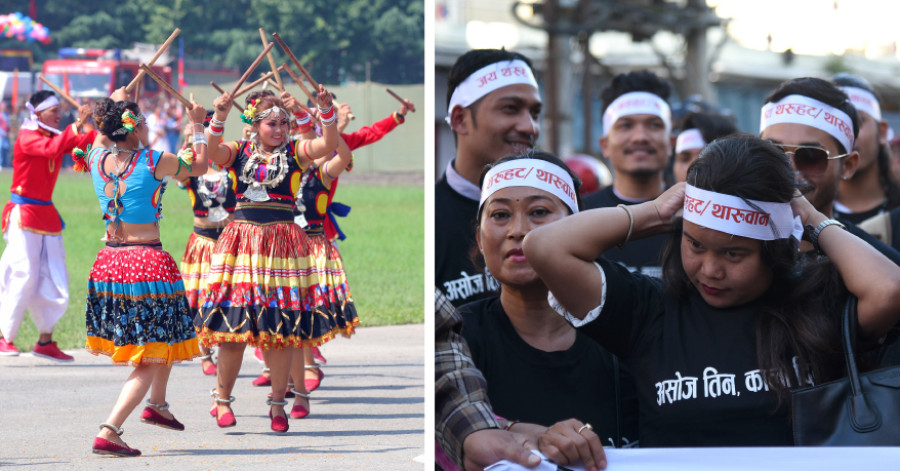National
Government celebrates Constitution Day while Madhesis and indigenous groups protest
While many donned t-shirts with the national flag, protestors wore black vests and black headbands protesting what they called a ‘black day’.
Tika R Pradhan
On Friday, the government marked Constitution Day with pomp and ceremony, at Tundikhel, as members of the Nepal Army donned the garb of various ethnic groups and performed for officials. However, in Kathmandu and pockets across the country, many of those very ethnic groups were protesting the constitution as discriminatory, demanding amendments.
At the Army parade ground, Prime Minister KP Sharma Oli said that the day should create a feeling of celebration among all Nepalis.
“We Nepalis were starving for this day for the past seven decades. The day when we were liberated from suppression is also an independence day and a day to celebrate our achievements,” Oli said.
But not everyone felt the same way, as many Madhesis, Tharus and indigenous groups marked September 20, Constitution Day, as a ‘black day’.
For nearly a month, the government has pushed for an all-out celebration, providing a national holiday, requiring civil servants to attend celebratory programmes and asking the public to don t-shirts emblazoned with the Nepali flag. But protesting indigenous groups wore black vests with ‘Asoj tin kalo din’—Asoj 3, a black day—written across it.
At Basantapur, three indigenous protestors were arrested while preparing to burn discriminatory articles of the constitution. In Dang, six protestors were arrested even as indigenous groups burnt copies of the constitution at different parts of the country, including Itahari, according to Govinda Chhantyal, vice-chairman of the Nepal Federation of Indigenous Nationalities (NEFIN).
NEFIN, the umbrella organisation of indigenous nationalities, has been leading protest programmes against the constitution ever since it was promulgated in 2015. Janajati leaders speaking at Basantapur raised questions over the government’s failure to amend the constitution in the four years since its promulgation.
“On Asoj 3, discrimination was imposed on us so we cannot follow the government’s orders and celebrate this day,” said NEFIN Chairman Jagat Baram. “Prime Minister Oli talks about peace and prosperity but neither will be possible unless the discriminatory constitution is amended.”
Protest programmes were visible especially in Province 2, where the Madhes-based Rastriya Janata Party Nepal led a rally in Janakpur with black headbands and black flags as symbols of protest.
Addressing the rally, RJP leader Mahanta Thakur said that protests would continue as long discrimination persists.
“The Madhesi people have been fighting against oppression, injustice and discrimination for a long time,” said Thakur. “We are against the demarcation as the entire Madhes has been split into different provinces. That’s why we consider this day a black day.”
Madhesis, indigenous nationalities, Dalits, women, Tharus and Muslims are preparing to form a united front to demand amendments to the constitution, said Minraj Chaudhary, a Tharu activist.
“Today, the government has suppressed our peaceful struggle by arresting protestors in different parts of the country,” said Chaudhary. “But we will launch a stronger protest after the end of the festival season.”
Santosh Singh contributed reporting from Dhanusha.
***
What do you think?
Dear reader, we’d like to hear from you. We regularly publish letters to the editor on contemporary issues or direct responses to something the Post has recently published. Please send your letters to [email protected] with "Letter to the Editor" in the subject line. Please include your name, location, and a contact address so one of our editors can reach out to you.




 18.12°C Kathmandu
18.12°C Kathmandu














